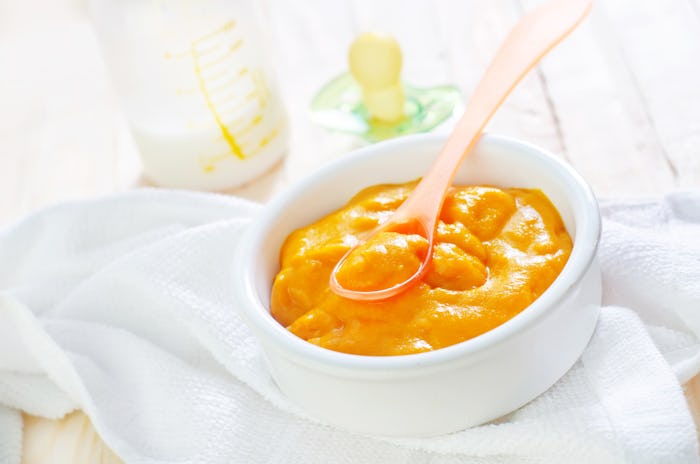Life

Making My Baby's Food Isn't Just A Hobby — It Helped Me Heal
When I had my second child I was determined to breastfeed. I knew it wasn't going to be easy. I had a breast reduction when I was 17, and I was unable to breastfeed my first baby due to low milk supply. So believe me when I say I was acutely aware of how difficult breastfeeding can be. But that knowledge didn't save me from the surprise, or the pain, of realizing that formula-feeding would be the best choice for both me and my child, though. Five weeks attempting to breastfeed, and ultimately turning to formula, left me grieving an experience and connection I truly believed I could enjoy. I also didn't know that making my own baby food would help me come to terms with formula-feeding and, essentially, give me the closure I was missing.
Like many babies, my daughter started solids around six months. I considered my options. While the jarred baby foods available to parents have improved substantially, there's no denying the growing popularity of making your own. And while it didn't cross my mind to do so with my son, after reading about the benefits of making your own baby food and experiencing the heartache that is wanting to breastfeed but being unable to, I set out make my own food for my daughter. I was surprised by how excited the entire process made me feel. In a way, I was involved in providing her food again. I was taking back something I lost when I couldn't breastfeed.
I started with Pinterest and pinned as many simple recipes as I could. My sister gave me a bunch of reusable containers designed for baby food, but I found that any old containers would really do. I considered a baby food maker but found that my food processor and/or blender would do the trick. Since my daughter's pediatrician said my partner and I could introduce solids when our daughter was between 4- and 6-months-old, I started paying attention to her hunger cues in order to determine when she would be ready for my home-made purées.
In a way, I was involved in providing her food again. I was taking back something I lost when I couldn't breastfeed.
Thankfully, it didn't take me long to realize the entire process wasn't nearly as overwhelming or complicated as it may seem. I didn't need to spend a lot of money in order to make my daughter's food, either. While advertisements for certain products designed to help parents make their own baby food would tell you otherwise, all I really needed was a blender and some storage containers. I would make big batches at once, labeled the containers with dates, then froze what I wasn't going to use that day. Little by little, and as my freezer filled with baby food I made myself, I started to feel as though I was gaining more and more control over what was going into my daughter's body.
Studies highlighting the benefits of homemade baby food didn't hurt, either. In fact, a recent study published in the International Journal of Obesity, explained that babies who are fed homemade baby food have a much more diverse diet and a lower fat mass than the babies who ate store-bought foods. Lead author Dr. Elise Mok of the Research Institute at McGill University Health Center and the Montreal Children's Hospital said, “The results could have implications for preventing obesity and chronic diseases associated with poor food choices." While I absolutely believe fed is best, the benefits of breastfeeding can't be denied, making my daughter's food provided me with a feeling I, honestly, lost when I made the switch to formula: that I was giving my daughter the very best.
Little by little, and as my freezer filled with baby food I made myself, I started to feel as though I was gaining more and more control over what was going into my daughter's body.
Being able to do more than just scoop, pour, and shake store-bought cans has helped me defy the idea that I wasn't a "good" mom because my body couldn't produce enough breast milk. In a way, making organic baby food has provided another level of bonding in my daughter’s and my feeding experience, and I’m enjoying it every single step of the way. There's something so satisfying about learning what my daughter's likes and dislikes are — the textures she loves and hates — and automatically knowing when she's full. The level of involvement necessary to make organic baby food has helped to reassure me that I’m a good mom and that I've still got this, my ability to breastfeed be damned.
After watching my plans to breastfeed change, and adapting to formula-feeding while simultaneously saying goodbye to the hope that I would be able to nurse, it's safe to say that making my daughter's food goes way deeper than just making sure she's fed. It's helped me feel a part of her feeding experience again. It's ultimately brought me even closer to my daughter, and made mealtimes more fun for the both of us. I don't think, as a parent, you can really want anything more.